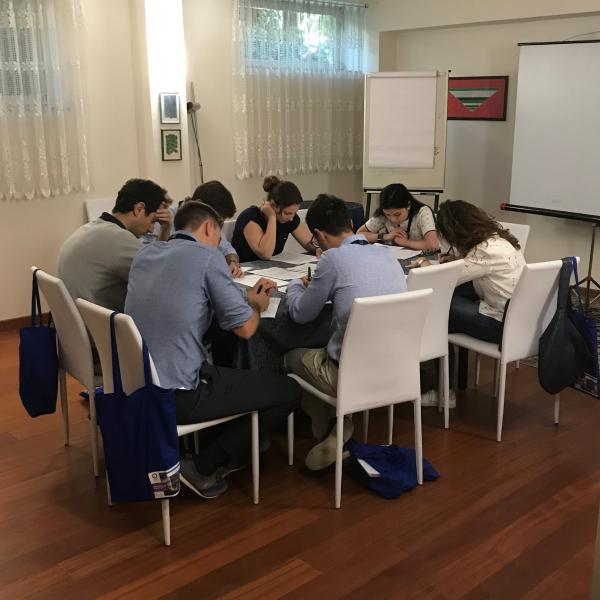Multiple Sclerosis: Setting Priorities

International Survey on Research Priorities for Cochrane Systematic Reviews on Multiple Sclerosis
The Cochrane Multiple Sclerosis and rare Diseases of the CNS Review Group is running a survey by an online questionnaire collecting your views and ideas about research priorities for systematic reviews on multiple sclerosis.
ON METHODOLOGY FUNDAMENTALS

On the subject of methodology, the COVID 19 pandemic has stimulated a lot of discussion about design of clinical trials,
from this came our idea to highlight essential methodological concepts.
In order to become more familiar with methodological issues the Cochrane Neurological Sciences Field decided to interview two experts in Neurology and Clinical methodology, both from the world of Stroke, International Clinical Trials and Cochrane, on various topics.
The Methodology Fundamentals are aimed primarily at young people, but can also be particularly useful to health professionals who wish to reorganize their knowledge in the methodological field.
We hope that these brief and informative discussions will tempt readers to further investigate the issues proposed, to this end we will select and attach papers that help to highlight the topics at hand.
Who are the experts?
Stefano Ricci - Editor, Cochrane Stroke Group, Perugia, Italy, and
Peter Sandercock - Emeritus Professor of Medical Neurology, University of Edinburgh, UK.
What are the Methodological Questions?
1) When are observational studies enough?
2) Why RCTs are better than observational studies?
3) What kind of RCTs are needed today?
4) Why it is so difficult to plan and arrange large pragmatic trials?
5) What regulatory authorities should modify to allow for the realisation of these kind of trials?
6) How can we ensure that clinical research is done where the results will eventually be applied?
The answers to these questions are the result of discussions between the two experts:
Go to "Spotlight on Methodological Fundamentals" for the answers.
-------
Raccolta Speciale: Coronavirus (2019-nCoV): evidenze per la terapia intensiva

L'epidemia di Coronavirus del 2019 è stata dichiarata un'emergenza globale di sanità pubblica dall'Organizzazione Mondiale della Sanità (OMS) lo scorso 30 gennaio 2020.
L'OMS sta ora lavorando a stretto contatto con esperti globali, governi e partner vari per espandere rapidamente le conoscenze scientifiche su questo nuovo virus, per tracciarne la diffusione e la virulenza e fornire consulenza a paesi e individui sulle misure per proteggere la salute e prevenire la diffusione del contagio.
Cochrane ha pubblicato oggi una Raccolta Speciale di Revisioni Sistematiche: Coronavirus (2019-nCoV): prove rilevanti per la terapia intensiva.
Questa Raccolta Speciale della Cochrane Library mette insieme le più rilevanti revisioni Cochrane per la gestione delle persone ricoverate in ospedale con gravi infezioni respiratorie acute. Comprende le revisioni di tre gruppi Cochrane, parte della Rete Acute and Emergency Care, che informano il processo decisionale in materia di salute relativo alle attuali raccomandazioni dell'OMS per l'epidemia di Coronavirus del 2019.
La raccolta verrà riesaminata man mano che la situazione cambia per garantire una pertinenza costante. Verranno raccolte separatamente le revisioni sistematiche relative alla prevenzione e alle misure di controllo delle infezioni.
Leggi la Raccolta Speciale Cochrane completa: Coronavirus (2019-nCoV): evidence relevant to critical care
Per saperne di più: Rete Cochrane Acute and Emergency Care
- - - - -
This site is a source of useful information for people around the world who are involved with or interested in the practice of evidence-based neurology. We function as a link between clinicians, trainees, consumers, carers, policy-makers and Cochrane in the area of neurology.

The Cochrane Neurological Sciences Field is an entity of Cochrane, an international not-for-profit organization made up of more than 36.000 people around the world who work to promote evidence-based approaches to medicine.
The Cochrane Neurological Sciences Field works with neurological Cochrane Review Groups to improve their productivity and communicate the results of their research to a worldwide neurological community.
The primary aims and activities of the Cochrane Neurological Sciences Field include the following:
- Facilitate the production of systematic reviews in neurology and neurosurgery
- Promote the work of and serve as liaison for neurological Cochrane Review Groups
- Facilitate access to Cochrane reviews and disseminate reviews to a worldwide neurological audience
- Promote an evidence-based approach to healthcare in the field of neurology
